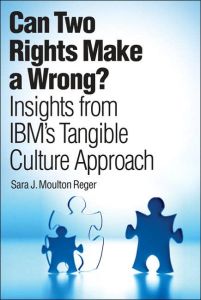Join getAbstract to access the summary!

Join getAbstract to access the summary!
Sara J. Moulton Reger
Can Two Rights Make a Wrong?
Insights from IBM's Tangible Culture Approach
IBM Press, 2006
What's inside?
Most M&As fail, and cultural conflict is often the cause – not because everybody’s wrong, but because they’re right.
Recommendation
Mergers and acquisitions (M&As) are a permanent part of today’s business landscape. Firms routinely buy other firms or combine with other companies, or sell off business units to focus on core capabilities. Nevertheless, half of all M&As don’t work, often because the companies’ corporate cultures clash. IBM organizational change expert Sara J. Moulton Reger discusses how disparate companies can come together successfully after an M&A. She bases her recommendations on the experience she gained in 2002, when IBM acquired PricewaterhouseCoopers Consulting for $3.5 billion. Unfortunately, she does not always explain her story clearly: She tends to bury important points in an avalanche of details, and she never met a buzzword she didn’t like. If you can transcend these stylistic infelicities, you will find IBM’s approach to this common problem useful, although time consuming. getAbstract recommends this book to executives and managers who are considering or are already involved in M&As.
Summary
About the Author
Sara J. Moulton Reger was head of IBM’s Organization Design and Change Management Practice and played a leadership role in IBM’s 2002 assimilation of PricewaterhouseCoopers Consulting.

















Comment on this summary